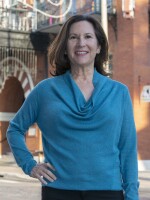Sarasota County has a higher percentage of people over 65 than any other large county in the nation. And some business leaders now say that all those seniors - rather than a demographic drawback - could be a valuable asset.
They could actually help diversify the economy - even turn the county into what they're calling a "mecca" for those who want to learn what an aging population looks like.
When economic development officials in Sarasota began to look at the preponderance of seniors for opportunities, the Institute for the Ages was created. As the Institute's President and CEO Tom Esselman puts it, they help "connect innovators with older adults."
One of those adults is Phyllis Bek-gran, a vivacious 89-year-old. Bek-gran lives alone in a cheerful condo in Venice, where she can drink her morning coffee in a sunroom that looks out over an expanse of tidal marsh, and where the walls are covered with fine art, including paintings by her late husband.
She wants to stay there as long as possible. So when she had the chance to test out a device that would let her out-of-town family monitor her daily activity, she happily agreed. Matchbox sized movement detectors were scattered through the apartment, in places such as her medicine cabinet, the TV remote control, and the refrigerator door. They reassured her family that she was staying on her normal routine, and Bek-gran found them less intrusive than cameras.
"Lively" is the name of the California-based company that makes the device, and Bek-gran's feedback -- along with 29 other seniors who tested the device -- is helping Lively bring it successfully to market. What this 89-year-old thinks is worth a lot to Lively -- and to other companies with new products and innovations.
And with one in three people in Sarasota County over the age of 65, there are a lot more like her -- older people who could attract to Sarasota innovators, researchers, and policy makers interested in the subject of aging. Some business leaders think that they could help diversify the economy away from tourism.
"If you want to learn about or participate in the opportunities associated with aging, we want this to be the mecca," says Esselman. "If you imagine the economy around here as a tourist economy, in the long term we want to balance that with what the AARP has coined the 'longevity economy'. "
About 900 seniors so far have signed up for the Institute's market research database. Esselman is confident that the number will grow to 40,000 to 50,000, as word gets around. He says the participants in the Lively project enjoyed having their voice heard, and knowing they're making a difference in the product's development
Esselman -- who previously worked as an executive at Hallmark -- says he's determined that the Institute will stand for more than simply selling access to the elderly, which he calls a "dangerous trap." He says he wants to balance economic development with social good -- by making the Sarasota area the center for learning about positive aging.
Meanwhile, Phyllis Bek-gran says she can't wait to install the monitoring device she tested out. "I think it's so important for elderly people to have this independence to be able to stay at home," she says. "I just think having a restricted environment would be terrible. I would hate that."
Her feedback on the motion monitors could help her keep that independence. The Lively monitor is expected to launch the end of September.




